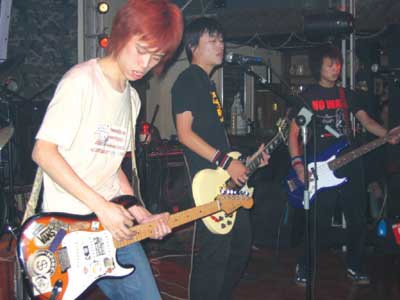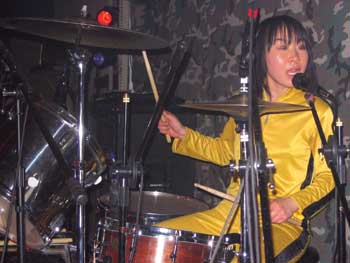| Hip hoppers, rappers and punks... take Beijing |
| http://www.sina.com.cn 2004/04/29 15:17 中国周刊 |
Alternative music is making a home in China as local musicians put Chinese lyrics to modern Western music styles. China's young rappers and rockers sound good, and, as Mark Godfrey finds out, they look the part, too.
The syncopated beat certainly doesn't sound like it could be matched to a Chinese three-stringed erhu. And none of the fans filing in the door look like they're here for Peking Opera. It's a Thursday night down at the Yan Club in Beijing's newest artistic zone, a series of hastily converted old East German-designed factory buildings still marked with red slogans from the Cultural Revolution. Baggy pants, wide sunshades, basketball shirts and lots of hairgel seem conspicuous by their presence in this warren of obsolete electrical fittings factories. Tonight CMCB, Kung Foo Yiin Ts'ang and Dai Bing are facing off in a showcase of the city's leading rap and hip hop artists. An Ear to the Ground is a series of shows in this multi-media arts club. Sponsored by car-maker Volkswagen and promoted by Sino-German events organiser Logistix, the shows are intended to give a sorely needed stage to Beijing's punks, rockers, rappers and folk artists. While Beijing's club scene is expanding rapidly, live music is confined to bars about the city. And live music there usually takes the form of easy-sounding cover bands, most of them from the Philippines, playing residency gigs in large bars and hotel lobbies. An exception to the rule, The Get Lucky Bar in the city's main Sanlitun bar district, charges rock fans 40 Yuan (4 euros) on weekend nights to see local rock favourites like Thin Man and spiky haired punk quartet Brainfailure. Billed as "one of the loudest, wildest, raunchiest bands in town," the latter have a large student following and do manage to live up to their promo promises, certainly by virtue of amplitude and the band's Johnny Rotten leers. Headliner at the Yan Club show is the father of Chinese rap, Dai Bing, a diplomat by training. He's been rapping since 1986, when he started singing R'n'B tunes he picked up from an African American friend. China was then still only in the formative stages of its "opening up" policy but Dai Bing was perfecting the moves and sounds of hip hop and rap, taking his cue from inventors of the genre, US artists like Ice Cube and Public Enemy. He's had his tracks used in advertising campaigns for sports products and chocolate, worked as a music producer for several local TV stations and contributed vocals to the environmental theme song "Let Green Be Seen and Heard." His rap career started shortly after Dai Bing's graduation from the Institute of Diplomacy in 1990, when he released his first English-language single, "Rap Man." Sharing the bill with him tonight, younger outfit Kung Fu meanwhile see themselves as a modern hip-hop continuation of traditional Chinese culture. Basketball and Chinese opera fan Yang Fan is the band's 22 year old lead singer. By day he works in computing. "The three of us got together in October 2001 because we shared the same lifestyle and musical interests" says Yang Fan. "The live performances of our hip hop and electronics are very emotional and that inspires us and makes us make more music." The release of the compilation album Xi Ha Now China seemed to open the sluice gates and more and more hip hop and rap bands are spilling onto Beijing's music scene. One of the biggest hurdles to local outfits like Kung Foo and Brain Failure is getting recording and distribution deals. Independent record labels are a relatively new concept to China, but finding record shops to stock minority-taste local product is even more difficult. "Fans are always coming into our office looking for our CDs" says Shen Lihui, general manager of Modern Sky, a leading recorder of Beijing's home-produced avant-garde, rock and alternative music. "The big problem is we have no direct sales circulation of our recordings" explains Shen. Modern Sky has produced over fifty albums since the label was established in 1997, making it the largest recorder of indie music in China. Bands on its roster include rockers Chaoji Shichang (Supermarket), the punky Bad Head and Bianli Shangdian (Convenience Store). Though relatively small-scale by the standards of American and European independent labels, Shen says Modern Sky wants to "...raise the profile of underground bands or independent artists... We want to give people more listening choices." Next in Shen's list of ambitions is the grounding of a "chain" of live venues across China where Modern Sky bands can get consistent live exposure.
The Ear to the Ground series is sponsored by carmaker Volkswagen's Sound Foundation and has been running for two years already. The concert series plans to expand in 2003 says Logistix's Olivia Kraef. Ear to the Ground has also helped bands to draw attention from record companies. "The series has established itself as a strong brand and a regular feature of the Beijing music scene. We have a lot of press and record companies attending our concerts" says Kraef. The bands for the concerts were chosen by Xiao Nan from promotion company Newbees Music. Xiao is a former front woman of Chinese female rock band Cobra. "Sometimes the bands also approach us themselves" says Kraef. "In November 2003 the bands were chosen by a group of people, all of them involved with Chinese rock in the 1980s." Logistix is now planning a series of concerts for 2004 that will feature both local bands and international artists. Logistix is now working on widening the concerts' audience explains Logistix's Kraef. "We want to make more people aware of our event. We make a special point in inviting students of both the Midi School and other modern oriented music schools to the shows. They have become a regular audience, just like many expats and Chinese artists." Logistix has been successful in bringing the best and the most promising of Beijing's rock groups together to the attention of fans and interested foreigners. "Yeah, the bands are generally good. Sometimes the melodies are a bit too similar to well known Western songs but the playing is pretty good" says James Mulkeen, a British fan who's attended three Logistix shows. "I think the hip hop acts are best. They're really pushing at borders. But it's also great to see rock acts mixing guitars and traditional instruments." Bending to the pressure of the audience perhaps, the annual Top China Music Awards recently included an awards category for rock and hip hop musicians. Organisers felt the quality of rock releases in 2003 warranted a special category for bands outside the Mando-pop acts which traditionally dominate the awards. Five separate prizes will be awarded to rock acts in the future, from best rock album to best song, best new artist and best band. There's also an award for best artist. Some bars in Beijing, Shanghai and other cities play little live or recorded rock, rap or hip-hop music, preferring to please tested local tastes with local and imported pop tracks. Breaking the mould in Beijing is Lu Lingyun, owner of Get Lucky, the city's best known rock bar. Lu has given many young Beijing bands their first gigs and has nurtured many others through concerts at his bar several times weekly. The audience at Get Lucky shows is made up largely of students - local and foreign. The prospects of Lu's business seem good considering the constant increase in foreign student numbers at Beijing universities. An encouraging aspect of the Beijing rock bar scene is the presence of some talented girl groups. Hang on the Box is a three-girl rock band playing aggressive songs and a punky look. They've toured the United States with punk stars Brain Failure and have two records to their name since getting together in 1998. More on the mainstream, Chinese rock acts like Beyond and Zero have both filled Beijing's Worker's Stadium recently with fans of their pop-rock sound. Bands like Tang Dynasty and China's godfather of rock, Cui Jian, are still playing to sizeable audiences, more and more of them in Europe in Cui Jian's case. With an American manager running his business affairs Cui Jian put together China's most successful rock festival thus far in the summer of 2003. Visits by leading British group Suede and eclectic electro-pop act Morcheeba in the spring of 2003 gave local rock fans much reason for courage. Still, the stamp of approval that Chinese rock bands and fans were excitedly waiting on in April of last year never came. The Rolling Stones were set to play shows in Beijing and Shanghai but pulled out when SARS began to take its grip on Asia. Rumour suggested that the band hadn't been able to sell all of the high-priced tickets allocated to the shows however and the ageing group hasn't since rescheduled its mainland shows. The Rolling Stones did however travel to Hong Kong in November for two concerts for which they picked up over five million US dollars. China has been a concert location long sought out by the 40 years-on-the-road rock group according to its lead singer Mick Jagger and chief guitarist Keith Richards. Prices are not particularly prohibitive for rock fans in China. Numerous CD shops in Beijing and provincial cities sell a large range of CDs by mainstream and lesser known acts from the USA and Europe. Genuine or faked, the CDs cost a fraction of what retailers in the west charge for similar recordings. Chinese publishers have also responded to the needs of the growing rock audience. Rock, published in Shanghai, is a well-designed magazine of news and reviews from the local and international rock and hip hop scenes. The magazine also runs adverts from international musical instrument makers looking to cash in on the local taste for rock. Beijing's rock scene has much to be optimistic about in the talent of new acts coming through. But getting recordings to the buying public remains a challenge. The vast majority of China's CD shops prefer to make their money selling real or pirated albums by big-name pop stars from home and abroad. And while a new bar or night club opens every other day in Beijing and other major cities, few give space to local rock acts writing their own material and playing new, untested tunes. More labels like Modern Sky are badly needed, while major labels such as EMI, Sony and Warner will also hopefully begin to take an interest in local rock acts. Before they do however local authorities will probably have to tackle rampant piracy of music recordings. Professional and committed bars and promoters like Logistix and Get Lucky are pumping blood into the vein of China's nascent alternative music scene and more of them wouldn't go amiss either. And even better if more Chinese acts follow the lead of Brain Failure and get out on the road to tour Europe and the US. Local groups could learn a great deal about their craft playing the summer festival stages and hip hop clubs of the west. Down at the Yan Club meanwhile a crowd warmed up on Tsingtao beer and near-weekend cheer shakes and shuffles on the floor, attempting to match dance floor steps to Dai Bang's vocals. There's a full house and a distinctively Bronx look is mixed with the suits and stilettos of curious night owls. Then Dai Bing rolls out one of his big hits "If You Do That Again I'll Be Angry" and everyone's moving to the beat. It's only rock n′roll, but China likes it. By Mark Godfrey |
| 【英语学习论坛】【评论】【大 中 小】【打印】【关闭】 |

